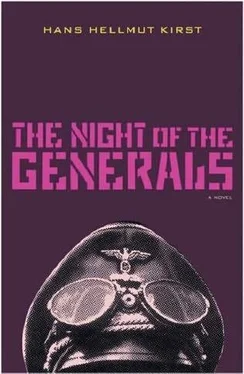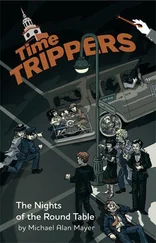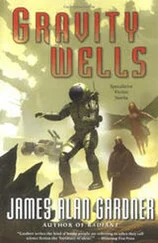One of the momentous decisions which were occupying the G.O.C. concerned Major Grau, who stood in his outer office displaying a mixture of pig-headed obduracy and bland affability. He wanted to have his say.
Kahlenberge said: “Why not?", left Grau in the outer office and went in to see his chief.
The G.O.C. was still preparing for the reception. His words of welcome were to be sonorous yet profound, courteous yet admonitory—in short, edifying. He had already mapped out the more important passages and was now engaged in polishing the finer details. Any distraction at this juncture was unwelcome.
“We’re not going to be able to avoid seeing our friend Grau, I’m afraid,” Kahlenberge told him. “As a matter of interest, he’s in a most peculiar state at the moment—still behaving like a gentleman but apparently determined to stage a sort of bullfight here with himself in the role of matador. It would be advisable to disabuse him of the idea immediately.”
“Didn’t Tanz manage to send the man packing?”
“No.” Kahlenberge sounded relieved rather than disappointed, almost as though he derived a perverse pleasure from being confronted with the problem of Grau once more. “Grau obviously realized that Tanz meant to give him a rough time. We couldn’t foresee that. Anyway, he beat a hasty retreat—in our direction, unfortunately.”
“Deuced embarrassing,” commented the G.O.C. “What do you think we ought to do now?”
“What one usually does in such situations, sir: keep talking.”
“Couldn’t we put him off—say, until tomorrow?”
“I shouldn’t advise it.”
As normally happened when he was confronted by a grave decision, von Seydlitz-Gabler experienced a moment or two of faintness and his stomach threatened to rebel. Then, as if he were controlling an unruly horse, he gathered himself for the next hurdle.
“All right, send him in.”
Major Grau entered the room like a man who intended to take possession of it, lock, stock and barrel. His usually immaculate clothing looked slightly crumpled but his smile was as bland as ever.
“I was under the impression,” he began, “that I was going to be able to pursue my official inquiries this afternoon. This had been agreed to, and General Kahlenberge personally made the necessary arrangements with your consent and approval. As it was, I found myself involved in a—hm, military engagement.”
“Most regrettable,” said the G.O.C. resonantly, “really-most regrettable.”
“Regrettable, yes—but true.” Grau still managed to preserve a smile. “And all the more regrettable in that it was a matter of which my department should have received advance notification.”
“Major Grau,” said the G. O. C, puffing like a weight-lifter in training, “I thank you for your interest and your gratifying willingness to co-operate. I fully appreciate it and shall draw the appropriate conclusions. When occasion arises I shall take the matter up again.”
Major Grau seemed to be amused. “I could insist on immediate clarification. I could even take the view that postponement is tantamount to concealment.”
“Is that meant to be a threat?”
“Perhaps only a warning,” replied Grau undeterred. “I have some questions to ask and I shall ask them.”
“Later please,” said von Seydlitz-Gabler with comparative vigour. “And kindly remember that military operations always take precedence over other matters.”
“Even when the solution of a murder case is being systematically impeded?”
“Even then, I’m afraid,” put in Kahlenberge with an inscrutable smile. “Military law takes precedence over criminal law. You won’t find that written down anywhere, but it’s a generally accepted fact—and for obvious reasons.”
General von Seydlitz-Gabler cleared his throat. “And now I must ask you to leave me alone with my Chief of Staff.”
There was something deliberately irritating about Grau’s smile as he withdrew, making his exit like an actor who was due on stage again in a minute or two. His parting salute bore no resemblance to the regulation movement and the G.O.C. did not deign to return it.
“Well,” said von Seydlitz-Gabler, “that settles his hash. His latest performance went a bit too far. High time for that change of air you mentioned, eh, Kahlenberge? It shouldn’t be difficult to arrange.—No, what I’m much more worried about at the moment is the news that there has been fighting in the city. What do you know about it?”
“Nothing much, sir—only that General Tanz laid on an exercise for this afternoon.”
“Without consulting us?”
“He only planned to hold an exercise,” Kahlenberge said cautiously. “Major Sandauer, Tanz’s G.S.O.1, informed me accordingly. I don’t know what it developed into.”
“Kindly request clarification,” ordered the G.O.C.
The process of clarification lasted nearly an hour. Kahlenberge conducted a prolonged telephone conversation with Sandauer over a newly laid direct line leading to Promenade Square.
Von Seydlitz-Gabler did not remain idle either. He also did some telephoning, in this instance to Supreme Headquarters, where he had an old Staff College friend who was in the closest touch with Admiral Canaris. It was a highly satisfactory conversation and one which demonstrated the value, if demonstration were needed, of the “old boy net.” Meanwhile, Frau Wilhelmine continued to receive her guests as they streamed into the festively decorated salon. She noticed that Lance-Corporal Hartmann had stationed himself respectfully within reach. His efforts to put together a representative programme had been crowned with success. There was to be Chopin, but only some waltzes and a few undemanding preludes. If any encores were needed, the gap could be plugged with an étude or two.
“You’re a very efficient young man,” Frau Wilhelmine told Hartmann appreciatively in an interval between guests-she had just extended her bony hand to the Reich Commissioner—"I feel I can rely on you.”
Hartmann blushed. He always blushed when he was uncomfortable, and he was uncomfortable most of the time. The new world into which he had been launched presented more surprises than he had bargained for. Within a bewilderingly short space of time he had been shuttled back and forth, willy-nilly, between life and death, Russians and Nazis, Chopin and Frau Wilhelmine.
“I’ll look after him,” said Ulrike, eyeing Hartmann with pleasure. “I’ll make sure we don’t lose him.”
“I hope,” Frau Wilhelmine said severely, “you haven’t forgotten why you’re here.”
Ulrike grimaced. “There’s not much hope of that.”
“Good,” said Frau Wilhelmine. “Then behave accordingly.” She turned to Hartmann with a gracious smile. “I’ll call you when I need you. Hold yourself in readiness.”
“Certainly, ma’am,” said Hartmann, glancing cautiously at Ulrike.
Meanwhile, the two generals had been doing what they could to sort out their problems, and that, in the third year of the war, was a good deal. Satisfied that his private network was still functioning admirably, von Seydlitz-Gabler felt that the world had resumed its ordered course.
“The following facts have emerged from my conversations with Major Sandauer and General Tanz,” Kahlenberge reported. “Units of the Nibelungen Division were engaged in an exercise this afternoon. Object: to explore methods of dealing with scattered hostile groups in a built-up area.”
“How did fighting break out?”
“Quite simple,” Kahlenberge went on. “General Tanz’s troops had just started their exercise when, according to Major Sandauer, they were suddenly fired on by members of the Polish Resistance. In consequence, the units engaged returned their fire.”
Читать дальше












